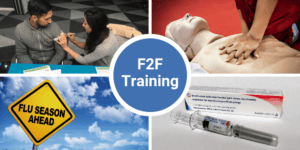Health Academy welcomes you to this 3 part series in which we will break down the following Public Health England (now the UKHSA) and Royal College of Nursing documents in relation to flu training and your organisation:
- National Minimum Standards and Core Curriculum for Immunisation Training for Registered Healthcare Practitioners.
- National Minimum Standards and Core Curriculum for Immunisation Training for Healthcare Support Workers.
By pulling out all the relevant information, we will help you understand why the document is so important to you if your organisation is a provider of flu and immunisation programmes.

Part I will look at the National Minimum Standards and Core Curriculum for ImmunisationTraining for Registered Healthcare document. We will establish what the document is, who it is for, and why it is important for you to know about it. Part I of our series is included below.
Part II will take you through the specific training pathways that registered healthcare practitioners should take to be able to competently, safely and effectively promote and administer vaccinations.
Part III will examine the training standards for healthcare support workers and how they differ from the standards for registered healthcare practitioners.
Part I – What is the National Minimum Standards Document and who is it for?

What is the National Minimum Standards document?
Healthcare practitioners from a wide diversity of professional backgrounds now give immunisations in many different settings and service areas. The National Minimum Standards and Core Curriculum for Immunisation Training for Registered Healthcare Practitioners is a key document. It sets out a recommended minimum framework for developing training to meet the needs of all registered healthcare practitioners with a role in immunisation. The document can be used by training providers as a ’checklist’ to ensure that any training being offered is comprehensive and meets the minimum standards for content.
Why should it concern you?
If your staff, are administering vaccinations then they will all be required to follow local and national guidance and will likely look to you for advice and direction for this. In addition there is a legal and ethical responsibility on the provider of vaccination programmes, for example, in England Section 3.31 of the core service specification for the national immunisation programme clearly states that providers of immunisation programmes have a duty to ensure that staff are fully competent and trained in accordance with these national standards.
What are the aims of the document?
The overall aim of the standards is to set out recommendations for commissioners, providers and trainers which describe the minimum training that should be given to all practitioners engaging in any aspect of immunisation, so that they are able to confidently, competently, safely and effectively promote and administer vaccinations.
Who should do immunisation training?

Any registered healthcare practitioner or healthcare support worker who wishes to administer vaccinations, should partake in immunisation training in line with their relevant training standards. However, in addition to this, the documents do recognise the fact that there are now many different staff involved in the immunisation process including some from non-clinical backgrounds, and that those providing advice or access to immunisation, in whatever service area, have access to training. This is important in order to ensure that they can provide basic information and facts, are able to advise where to get up-to-date information and give consistent messages about immunisation.
Who should deliver the training?
The standards state that training should be provided by an experienced training provider. While training would ideally be provided at a local level, it may be obtained from an experienced training provider elsewhere, provided the training comprehensively covers the standards and curriculum detailed in this document.
How should training be delivered?
The guidelines state that e-learning courses provide an effective mechanism through which immunisers can access training provided they are given specific, protected training time in which to undertake these.
Where appropriate or necessary (particularly for those new to immunisation), a blended learning approach can be utilised with an e-learning course(s) used alongside practical sessions to help ensure participants achieve all of the required learning outcomes and consolidate their knowledge.

At Health Academy we have a range of Flu training courses to suit the needs of all practitioners, from those who wish to take an e-learning only course, right through to those who want a good old fashioned hands-on face to face practical course.
Visit our dedicated Flu Hub now to explore all of this year’s flu options.

Already know what your staff need? Why not jump straight to it?
Part II
Don’t miss Part II of our series next week when we will be looking at the specific training pathways in the Core Curriculum document for healthcare practitioners with a free downloadable flowchart for easy reference.







